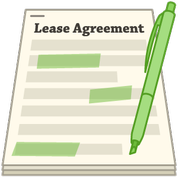Reading the fine print on lease agreements
 So you’ve found a great apartment, and all you have to do is sign on the dotted line to get your key. Well hold up there, speedy. Think about this: most leases are based on fairly standard documents designed to protect the owner of a property more than the tenant. So taking a few moments to review the details of a lease might prevent some headaches (and expenses) down the road.
So you’ve found a great apartment, and all you have to do is sign on the dotted line to get your key. Well hold up there, speedy. Think about this: most leases are based on fairly standard documents designed to protect the owner of a property more than the tenant. So taking a few moments to review the details of a lease might prevent some headaches (and expenses) down the road.
Don’t overlook the basics
When is your rent due? Is the amount specified in the lease correct? Can you pay online or set up recurring payments? Is there a grace period and/or fees? Are there limits to the number of guests you can have, or the duration of their stay? Where do you park? These are “basic” elements of the lease because they’re the ones that will affect you most. Which means if they’re wonky, they’ll hurt the most. So check them out.
Renewing or ending the lease
Make sure you look into stipulations on when and how to renew or end the lease. Some leases only require 30 days notice, while others demand 90 days or more. If you renew, is there an escalation clause that notes how increases are handled? If you’re moving out, is there a clause about showing the apartment to prospective tenants? Some landlords share keys with real estate professionals eager to find a new tenant, so make sure you understand who can show your apartment, and when. Poker night just isn’t the same when you have strange people walking through your apartment.
Improvements and maintenance
Typically, landlords handle all routine maintenance and repairs, but don’t assume anything. If your deck is getting splintery and the lease states that you have to maintain the finish, you can either kiss those blissful barefoot summer nights goodbye, or fix it yourself.
What about improvements? That hot-pink accent wall really pulls together your kitschy kitchen theme, but when you choose to move out, you might have to paint it back to boring old white (or pay someone else to) if you didn’t get approval first.
The great outdoors
If your new apartment has a great backyard perfect for parties, make sure the lease states that you have the right to use it. For starters, you’ll avoid the embarrassment of getting kicked out of your own party. Also, if that space becomes unusable for any reason (such as a busted sewer pipe requiring the back yard to be dug up), you’ll be eligible for a reduction in your lease. If you can’t use all the space you’ve been allotted, you don’t have to pay for it.
Meet Chuck, my gorilla
Just because the ad stated “pet-friendly apartments,” it doesn’t mean all pets are equal. So let’s imagine for a moment that it’s legal (because it’s awesome) to own a pet gorilla, and you (because you’re awesome) have one. Many leases have weight and/or breed restrictions for pets, and your giant hairy buddy might not be allowed. If you didn’t realize that, Chuck isn’t going to be happy when he’s banned from your new place. And you don’t want to see Chuck when he’s angry.
Getting your security deposit back
We’ve got a great article with tips on how to ensure you’ll get your security deposit back. But in many leases, the landlord is only responsible for returning it within a “reasonable” amount of time. If you want to be sure that “reasonable” doesn’t mean “six months,” you can add a provision to the lease requiring the deposit to be returned within a set timeframe.
In the end, nobody is going to stick up for your interests more than you, so take the time to read the entire lease before you sign it. And if you’re planning a move, you don’t have to go it alone. Moveline](http://www.moveline.com) simplifies the inventory process, gets fair and accurate quotes from reputable movers, and oversees your move from beginning to end. All without costing you a dime. Let us make your move easier than you imagined, freeing you up to spend time on more important things.
Back To Blog
